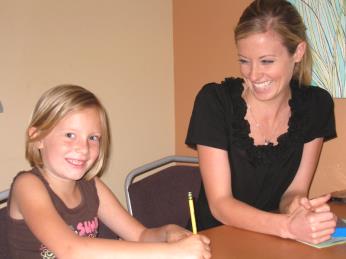
We first met Madi when she was completing her first year of kindergarten. She was struggling with reading and math, and her handwriting was a mess! She was behaving herself in school, but the tension from repeated failures in school was causing daily meltdowns at home.
Her teacher and school administrators were encouraging Madi’s parents to enroll her in special education. If the pull-out program didn’t work and Madi fell more than two years behind, they could enroll her in the local special day class for children with moderate to severe learning disabilities. There would be fewer students in the classroom, and the teacher would move at a slow pace to accommodate the most severely handicapped children. Madi’s parents had the sense to seek outside advice.
They took Madi to Kaiser for a full psycho-educational battery. Her psychologist diagnosed her with dyslexia and recommended outside intervention. She encouraged Madi’s parents to try intensive educational therapy/literacy intervention before making the drastic move to special education.
Diagnosing Dyslexia
Madi’s parents called for an appointment. Our assessment showed that Madi did indeed have severe learning problems. She had a lingering speech disorder causing her to mispronounce words, which made her speech difficult to understand. Like so many children, Madi’s speech disorder was related to poor phonemic awareness. Madi couldn’t hear the difference between the ‘w’ and ‘r’ sounds, so she couldn’t pronounce ‘r’ words correctly. Since Madi couldn’t hear the difference, it was practically impossible for her to learn the sounds for the letters, the skill necessary to begin reading. How was she going to learn that the letter ‘w’ is pronounced “wu” and the letter ‘r’ is pronounced “ru”, when, to Madi, they sounded identical?
We dug deeper into Madi’s challenges and discovered that this was just the tip of the iceberg.
Madi didn’t understand the basic concepts of words. To Madi, a long word was “train” and a short word was “caterpillar” (e.g. Is “train” a long word or a long object?). If she didn’t understand words, how was she EVER going to grasp the idea of sounds?
Was Special Ed the Answer?
Her parents collaborated with us to determine the best course of action for Madi. Putting her in a special education class would be less challenging, so it would reduce the pressure and lessen the frustration.
The question was whether or not Madi, being in a slower paced setting, would keep up with her peers who were attending regular education. If she started first grade in special ed, would she EVER close the gap, keep up with California State Standards, graduate from high school and go on to college?
But it was a catch 22! If she didn’t move to a slower paced classroom, how were we going to get Madi ready for first grade? She didn’t have kindergarten readiness skills. How could we possibly prepare her for first grade, even if we worked with Madi 5 days a week?
To Retain or Not to Retain – Difficult Decision!
Together with her parents, we decided to move Madi to a different school and repeat kindergarten. That was not a light-hearted decision. What if we were wrong? What if we lost a whole year of Madi’s life with another failing year of kindergarten?
But, on the other hand, what if we were right? What if she could be ready for kindergarten this time and keep up with her peers? What if she could stay in regular education and have a better chance for a higher education? We decided to go with plan B….work intensively on readiness skills over the summer and get Madi ready for another year of kindergarten.
Overcoming Dyslexia
That summer we saw Madi three days a week. We hammered phonemic awareness; Madi learned the concept that language is composed of words, and words are composed of syllables and syllables are composed of sounds. Once she knew that ”cat” is a word that represents that feline with a long tail, we could teach her that the word “cat” is composed of 3 sounds…’c’ ‘a’, ‘t’. Then we were able to teach her that the sound ‘c’ is made with the letter ‘C’, and the sound ‘a’ is made with the letter ‘A’ and the sound ‘t’ is made with the letter ‘T’. She started learning the sound-letter relationships. Madi was on the road to recovery!
Fast Forward to 4th Grade
Last time we talked to Madi, she was reading at grade level and writing powerful essays. She wants to be a teacher when she grows up! Ah…..That news made our day!
Remember our motto; early to talk, early to read, ready to succeed! The earlier we start remediation, the less time it takes to close the gap and, thus, also reduces the chances of a poor self-concept and behavior problems.
If you would like more information about our services, please contact us at 858.509.1131. It is never too early or too late to seek help.